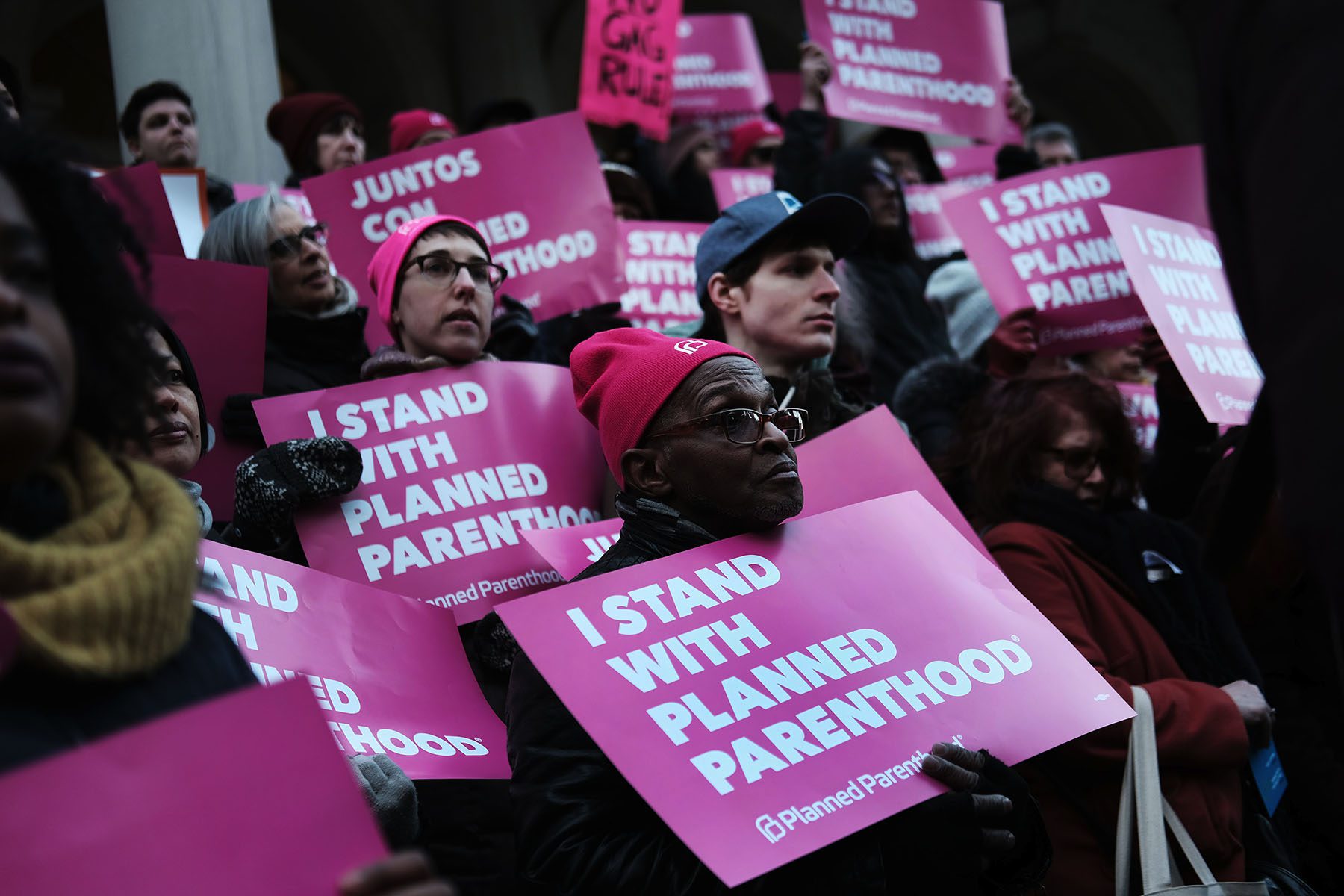Title X is the country’s only national, federally funded family planning program. First created with bipartisan support during the Nixon administration, the program has long provided no- and low-cost contraception counseling and dispensation to those who would otherwise be unable to afford or access it.
Then, in 2019, the Trump administration implemented a new rule that barred any provider in the Title X network from so much as mentioning abortion care to patients, even if the patient raised questions about it or asked for a referral. As a result, seven state governments and Planned Parenthood dropped out of the Title X network, not wanting to have any restrictions on their ability to provide comprehensive, medically accurate family planning services to their patients. (Title X has never and does not pay for any abortion care services themselves.)
On October 4, six months after proposing the change, the Biden administration said it was reversing the Trump policy, effective November 8. In 2021, Title X received $286.5 million in federal funding; funding for fiscal 2022 has not yet been set, though the U.S. House has passed legislation that would give it an all-time high of $400 million.
The 19th spoke with Ruth Dawson, principal policy associate for federal issues at the Guttmacher Institute, a nonpartisan reproductive and sexual health research and policy group; Clare Coleman, president and CEO of the National Family Planning and Reproductive Health Association, the national association for publicly funded family planning providers; and Mimi Garcia, communications director of Every Body Texas, the state of Texas’ Title X grantee, to break down what this change means for both Texas and the whole country when it comes to the ability to access publicly funded contraceptive care.
What is Title X?
Simply put, Title X is the United States’ family planning program, created in 1970 with the intent of addressing inequity in health care, and contraception especially, for low-income Americans. It has become the cornerstone of family planning nationwide, with a network of grant recipients and subrecipients specializing in family planning and contraception care.
Those receiving Title X funds include specialized family planning clinics, county health departments, and other government-organized or non-profit backed health care centers staffed with gynecologists, family medicine doctors, and family planning nurse practitioners who offer a critical range of reproductive health care services at no to little cost to patients. The vast majority of Title X recipients also receive funding from other state and federal funding sources, including state family planning programs and Medicaid, but Title X allows those in the network to reach patients who may be uninsured or otherwise unable to access health care.
The typical Title X patient is an adult woman between the ages of 20 and 29, is either working, in school, or both, and is often already a parent, Coleman told The 19th. Seventy percent of patients seen in a Title X clinic have incomes below the federal poverty level — $14,000 annually for an individual — and qualify for free care. Other low-income patients are charged on a sliding scale, though no patient is turned away based on their ability to pay. For two-thirds of all patients seen at a Title X clinic, Coleman said, their Title X encounter will be the only health care they get all year.
Significantly, though Title X focuses on reproductive and sexual health — including contraception counseling and dispensing, STI diagnosis and treatment, prenatal counseling, and some cancer screenings — those who receive care through these providers are also given a basic primary care workup, where their cardiovascular health is checked and they are screened for primary care intervention. Title X providers routinely refer to other kinds of health care providers, based on their patients’ needs.
How did the program change under the Trump administration?
In 2019, the Trump administration introduced a rule change that barred providers participating in Title X from engaging in what’s known as non-directive pregnancy counseling. In other words, Title X providers could explicitly direct pregnant patients to only prenatal care — and would lose their funding if they mentioned abortion care, even if it was something the patient asked about themselves. The Trump rule was challenged in court, but the suit against it was ultimately dismissed by the Supreme Court.
As a result of this new “gag rule” on abortion counseling and referral, at least 1,300 health centers stopped taking Title X funds. The Title X program went from seeing 4 million patients in 2017 to 1.5 million patients in 2020, a decrease of over 60 percent, said Coleman, who estimates that 20 million female-identifying people are in need of family planning care each year.
The Trump rule also imposed a restriction that any provider who received Title X funding had to be physically separated from any and all abortion activities, said Dawson. So this meant that a Title X recipient couldn’t even share an office with someone who so much as spoke about abortion or made external referrals for it. The rule also instituted some broad policies on reporting and enforcement, left to the Department of Health and Human Services’ discretion.
“Reproductive autonomy and individual decision-making are really written into the heart of the Title X program, and the Trump rule turned that on its head,” Dawson said. Additionally, not only could grant recipients only provide counseling on carrying a pregnancy to term and adoption, but the Trump rule also allowed for crisis pregnancy centers, often religiously-affiliated organizations that counsel patients against abortions and rarely provide the contraception that Title X funds usually cover, to now receive federal funds to do exactly this.
The Trump rule also eroded some of the confidentiality standards that had long been the standard of Title X, now encouraging providers to ensure that there was family participation in all decision making surrounding contraception and reproductive health care for both minors and adults alike.
What does the Biden rule change now do?
Most simply, the new Biden rule largely undoes the 2019 Trump administration rule, allowing providers to counsel and refer patients to abortion providers and reinforcing confidentiality standards. With the rule change, the Biden administration “returned the national family planning program to the high quality clinical standards that have governed the program for much of its 51-year existence,” Coleman said.
As a result of the rule change, Coleman said, many of the providers who left the network following the Trump administration rule change will likely rejoin it.
“The most exciting piece of the Biden rule is really returning the program to its original integrity by removing the requirements on it that were not based in science, like physical separation from any entity that does any abortion-related activities and the encouragement of non-confidential counseling,” Coleman said. “It restores broad and comprehensive options counseling to pregnant folks — and that is crucial that any pregnant person have that information and is provided with all the information and options about their pregnancy. That’s what Title X was intended to do and what its patients trusted it to do.”
What doesn’t the Biden rule immediately change?
That said, the new rule change doesn’t magically flip a switch for the providers that left the Title X network. Seven states withdrew from Title X altogether under Trump, and several other of the country’s largest states have swaths with no Title X providers. Any provider or clinic that left the program outright can’t come back in until the government runs a new competition for grant administration.
Coleman explained that it is expected that the Biden administration will hold such a competition this month that would give any applicant in the country — nonprofit or governmental health care providers such as a federally qualified health center or county health department – the chance to apply for Title X funding. These applications would, in theory, be due sometime in early to mid-January, and funding would be dispensed for new grantees in April.
The one possible workaround to this timeline is the “dire needs” grants that HHS announced in response to Texas’ Senate Bill 8, the new law that effectively bans abortion after six weeks. Providers who had left the network under the Trump administration — both in Texas and elsewhere in the country — could potentially apply for one of those grants and get funding before the end of 2021.
“Once the funding and support of the Title X program was taken away from a really large number of important providers across the country, it will take a real investment to build back the program to where it used to be and where it should be, which is even stronger than that,” Coleman said.
In addition, the Biden administration rule allows individual grantees to not counsel or refer patients for abortion care if they have a moral or religious exemption, though the impact of this is unclear.
The rules on the administration of Title X are greatly influenced by who is in the White House; though the Trump rule showed a major deviation from the history of how Title X had been regulated, the Biden rule shows the power of a new administration to reset — and also carve out exemptions as they see fit.
How does this rule change impact what is happening in Texas with its new law banning abortion after six weeks?
Because SB 8, Texas’ new abortion law, criminalizes “aiding and abetting” someone in getting an abortion, the new rule changes little for Texas providers, Garcia said. However, it makes a “big impact on the network as a whole” — something Coleman pointed out is particularly important given how many Texans are now having to seek reproductive health care of all kinds out of state.
“We are working to give the best advice possible to our providers and are working with attorneys to understand the impact the new rule will have on our network,” Garcia said. “At Every Body Texas, our values are focused on equality, health equity, and gender neutral and gender-inclusive care — so we are excited to see these values reflected on a national stage and now we are thinking about how we can best implement them on the ground.”
While it remains unclear what Title X providers can and cannot say in regards to abortion care in Texas, Garcia said their network is very excited to see the strengthening of confidentiality requirements for the provision of adolescent care. Garcia stressed how Title X providers are trained to spot situations where coercive power dynamics may be at play in a patient’s life, and how to implement practices so they can get their patients alone for the provision of care. “That way we can ensure that a client is given a confidential space to talk to their provider about their healthcare needs.”
And this is especially relevant for minors in the state.
“In Texas, Title X providers are the only providers who can provide care to these teens without parental consent. This is really important to the patients we serve,” Garcia said. “Texas has a high rate of repeat teen pregnancy; in our state, a teen is able to consent for their own child’s care, but isn’t able to consent to their own care.”
With the new Biden rule, a teen who accesses Title X can be guaranteed that they can receive information about and begin the contraceptive method of their choosing at no to little cost, and without anyone else knowing about the choices they are making.








